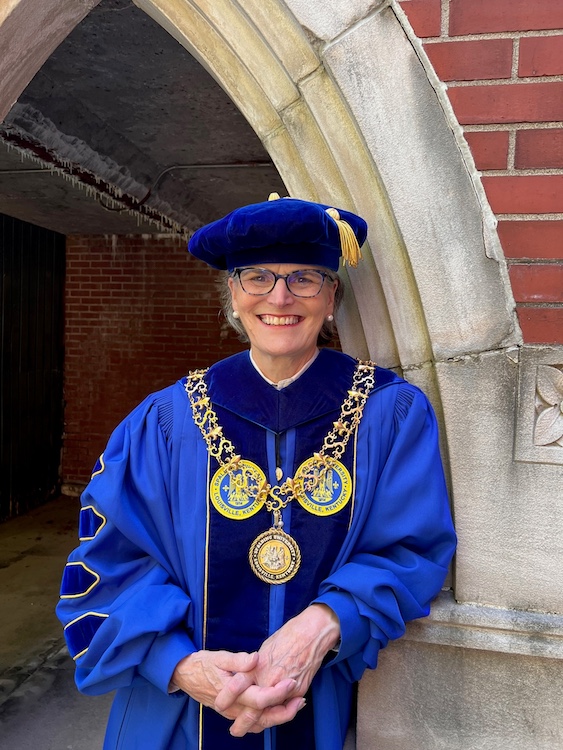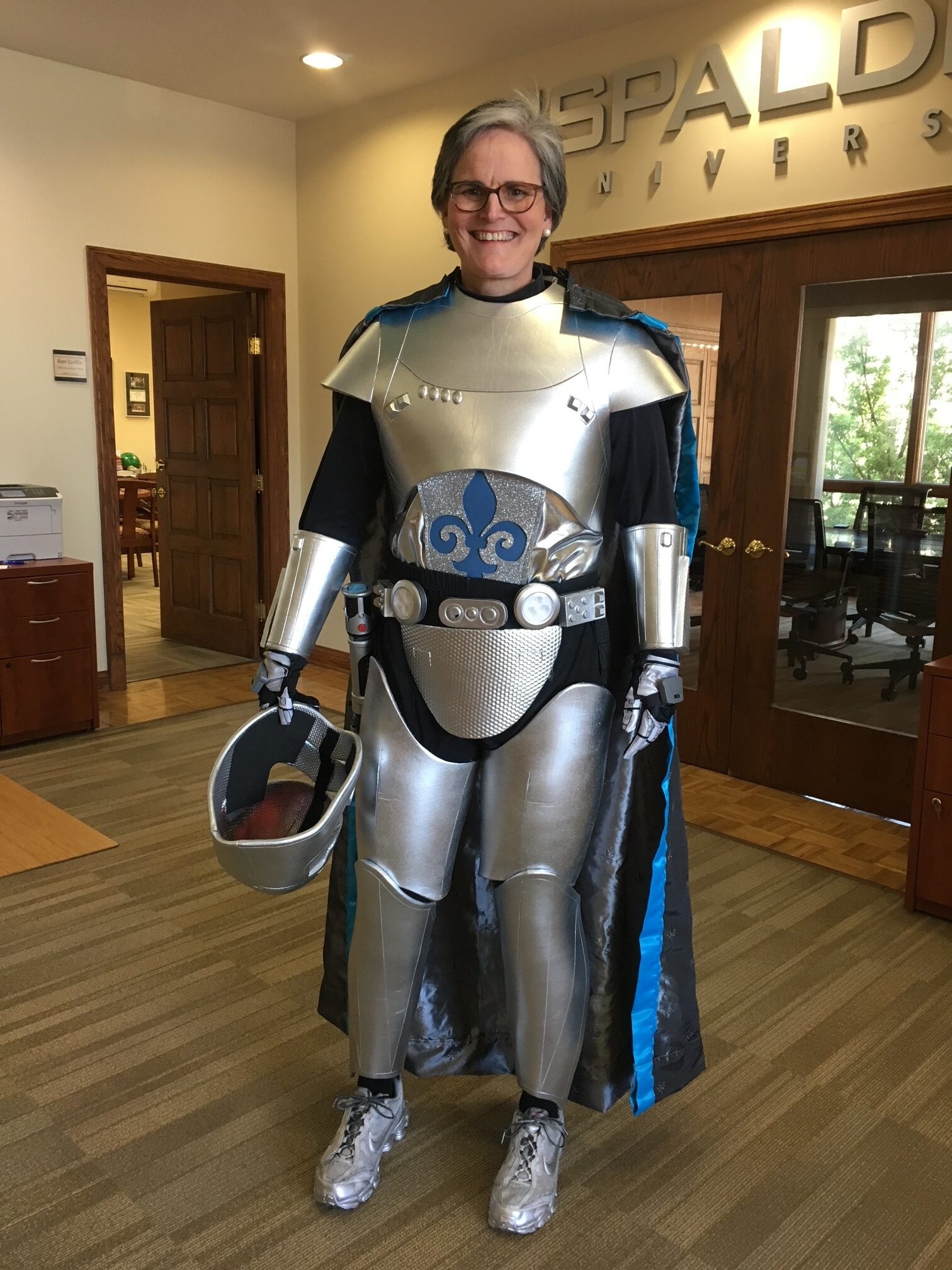President McClure’s Statement
After 25 Years of Service, President McClure Will Retire at the End of the Academic Year
President McClure's Statement
After serving Spalding University for twenty-five years, fourteen years as president, I am announcing my plan to retire at the end of this academic year, in June of 2024. The university and I have had a great run, and serving Spalding has been the honor of a lifetime. I plan to work diligently in the coming months to create a smooth transition for whomever follows.
In earlier centuries, it was not unusual for college or university presidents to serve two or even three decades. The average term for a president these days is not even six years. I was lured into this career by a conversation that I had with Mary Patterson McPherson. Pat served as the President of Bryn Mawr College for two decades. Pat hooked me with a simple challenge: she said that becoming a college or university president “is not for everyone, it really is quite difficult.”

It is a difficult job and I have loved nearly all of it.
Henry Wriston, who served as the President of Brown University, wrote that a university president must “speak continuously in words that charm and never offend, take bold positions with which no one will disagree, consult with everyone and follow all the proffered advice, and do everything through committees, but with great speed and without error.”
In a period when it was rare for women to serve in presidential roles, Clark Kerr, who served as President of the University of California observed that a president should be, “a friend to the students, a colleague with faculty, a good fellow with the alumni, a sound administrator with the trustees, a good speaker with the public, an astute bargainer with the state legislature, a friend of industry, labor, and agriculture, a persuasive diplomat with donors, a champion of education, a supporter of the professions (particularly law and medicine), a spokesman to the press, a scholar in his own right, a public servant at state and national levels, a devotee of opera and football equally, a decent human being, a good husband and father, an active member of a church, and a person who enjoys traveling in airplanes and eating his meals in public.”
In the early 1950s, a presidential search committee at Yale agreed that they were looking for “a leader, a magnificent speaker and great writer, a good public relations man and fundraiser, a man of iron health and stamina, married to a paragon — a combination of Queen Victoria, Florence Nightingale, and the best dressed woman of the year — a man of the world but with great spiritual qualities, an experienced administrator who can delegate authority, a great scholar, and a Yale man.” One member of the committee went on to ask, “Is God a Yale man?” While there is humor in these observations, they contain a hefty measure of truth.
I am grateful for many things.
As a woman, I am grateful for the doors that have been opened for me. I am thankful for Dr. Bernice Sandler the “godmother” of Title IX. Few people understand that the impetus behind Title IX had nothing to do with the participation of women in intercollegiate athletics. The goal was to compel colleges and universities to admit women into their graduate schools. It is difficult to become a university president if one is not permitted to obtain advanced academic degrees. I am a president because women like Dr. Sandler opened the road for me.

Like many presidents, some of my most cherished memories are of times I shared with students. From the sublime to the ridiculous, to the ridiculously sublime, there have been many moments of joy and happiness. Leaning toward the sublime, each commencement has been a time of celebration for the achievements of our graduates. On the side of the ridiculous, each year the students select a theme for me to design a presidential costume for the annual Run for the Rodents. The year the students chose Star Wars as a theme, I fabricated armor out of foam floor mats. I took the costume outside to paint it. A few hours later, my husband observed, “Dear, your armor is blowing around the back yard.” One year, the theme was Maleficent, and I created elaborate articulating wings with an eight-foot span. The 2024 theme is “Barbie.” I expect that I shall go as “the President.” Ridiculously sublime would be the times I hazed members of the Student Government Association by taking them backpacking, zip-lining through the Underground, or rappelling with them off the balcony of one of our buildings.
When I compare notes with my presidential colleagues, I realize that my tenure has been relatively idyllic. When I was appointed to become the President of Spalding University, I was serving on the Board of Trustees at Smith College which is my alma mater. One evening at Smith, I was seated with three presidents. On cue, one president offered, “You know you are a president when …,” she paused, the next president picked up, “half the faculty think they could do the job better than you …,” she paused, and the last president finished, “and the other half of the faculty think ANYBODY could do the job better than you!” Happily, this has not been my experience at Spalding.
Presidents sometimes describe their relationship with faculty as “troubled” or even “stormy.” There is a natural tension with presidents controlling the purse strings and faculty needing additional resources. However, I have enjoyed nearly constant support and goodwill from the faculty at Spalding. I rank them among the most dedicated professionals I have known. My respect for the dignity of the scholarly life is unyielding and I look forward to having more time to read more books, articles, and academic papers written by our exceptional Spalding faculty.
Because my career did not rise through the ranks of the faculty, I consider myself a member of the Spalding staff. At the risk of sounding prideful, the staff at Spalding are freaking spectacular. They are what makes our “Compassionate University” compassionate. They wrap their concern for the wellbeing of our students around them like a protective blanket. They tutor, they counsel, they coach, and they problem solve. I shall miss their passion.
Most of all, I will miss each and every member of my Leadership Team. Most have been with the university for more than a decade. They have tutored me, counseled me, coached me and problem solved with me through every step of this magnificent journey. Happily, I do not plan to leave town, and I hope that we shall remain friends.
I would be remiss if I did not acknowledge a debt of gratitude that I owe to the Sisters of Charity of Nazareth who founded Spalding University and who equipped us with the inspiring Mission to be a “diverse community of learners dedicated to meeting the needs of the times.” The Sisters left deep footprints for me to follow. I have sought to emulate their examples with dedication and faithfulness.
Finally, I want to send my gratitude and very best wishes to my presidential colleagues and to the people who support them. In prior centuries, university presidents were public intellectuals who actively participated in the news of the day. They wrote legislation. They played starring roles in our democracy. They hammered in guardrails at the edges of intellectual inquiry and placed ethical safeguards around scientific research. Before we get nostalgic, let us remember that our presidential predecessors were often wrong. As an example, Lawrence Lowell, the president of Harvard, voiced muscular opposition to the appointment of Louis D. Brandeis to the United States Supreme Court. While Lowell claimed Brandeis did not enjoy the “confidence of the bar,” it seems more likely that Lowell opposed this appointment because Brandeis was Jewish. Presidents of former eras did not always speak with wisdom, forethought, or compassion.
Today, when presidents speak out, or they fail to speak out, on the issues of our time, they risk the ire of their donors, backlash from their faculty, and the threat of actual harm being done to their students by disagreeable people coming to campus and causing physical mayhem. The issues faced by modern presidents are weighty and multifaceted: rising student debt, student safety and mental health concerns, sexual harassment and assault, supporting diversity, reducing prejudice, bridging political and ideological divides, protecting freedom of expression and academic integrity, and a multitude of other responsibilities that include simple things like intercollegiate athletic programs. I ask our critics to remember that presidents are merely human, and that while many of us have the intellectual stomachs of goats, no one can be an expert in everything, all at once, and immediately.
Still, we try. I sometimes think my biggest claim to fame was that I was the acting Board Chair of the Board of Governors of the NCAA during football season of 2020. Can you imagine a woman, from an NCAA Division III school, which does not have a football team, helping to determine whether football could continue to be played in the United States of America? I have never been afraid of difficult things. Many of my colleagues are equally brave.
What will I do next?
My husband, Charles “Mac” McClure, has been a steadfast partner and my biggest supporter throughout this journey, though no one would describe him as “Queen Victoria, Florence Nightingale, or the best dressed woman of the year.” Mac has encouraged me to take several months away from work before taking a new job. Whatever is next, I want to get a life, learn to weld, learn to sail, build more boats, read more books, spend more time with friends, and to enjoy more of everything
Tori Murden McClure
Spalding University President
